Economy seen as resilient, despite a wide array of challenges
(New York, NY) China’s economy is beset by a number of challenges ranging from shadow banking to escalating real estate prices, but steady economic growth should provide a cushion for the country.
That’s according to Li Haitao, Dean’s Distinguished Chair Professor of Finance at the Cheung Kong Graduate School of Business (CKGSB), who was speaking at a symposium in New York, which featured a stellar line-up of experts in US-China relations, including Ambassador Stapleton Roy, the former US envoy to China; Hank Greenburg, who was instrumental in opening up the financial sector in China; and Ambassador Charlene Barshefsky, a former US trade representative who played a central role in the negotiations for China to enter the WTO in 2001.
The sold-out symposium, “Understanding China Today”, was co-hosted by CKGSB, Princeton University’s Center on Contemporary China and The Julis-Rabinowitz Center for Public Policy and Finance.
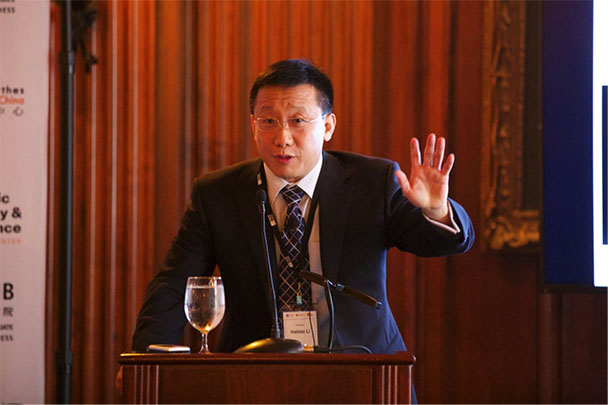
Dr Li (pictured above) was discussing the five “grey rhinos” confronting China: shadow banking, the high leverage levels seen in state-owned enterprises which bedevil their operations, a real estate bubble which has driven housing prices sharply higher, local government debt to finance their operations and illegal financing which has resulted in overcapacity weighing on the economy.
“I’m an optimist,” said Li, who is also Associate Dean of the MBA program at CKGSB, adding the pace of growth should bolster per capita income from the current US$8,000 to US$20,000 or even US$40,000 in the years ahead and help mitigate the adverse effects of those problems.
“Most Chinese investors are poorly diversified,” Mei Jianping, another professor of finance at CKGSB, said on the same panel.
He added: “Given the high real estate and equity prices, Chinese baby boomers could lose big if the asset bubble deflates under tight monetary policy.”
Those baby boomers could also lose out if inflation spikes, the CKGSB professor, who has also taught at Princeton, pointed out.
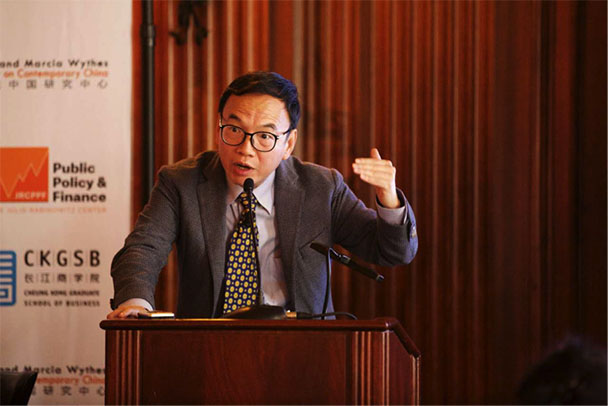
Aside from being a professor, Mei (pictured above) is also director of the CKGSB Real Estate Research Institute and his major area of research includes international asset pricing and real estate finance. Wei Xiong of Princeton University and Jian Hu, managing director of Moody’s Investor Service, also shared their insights on some of the challenges facing China’s economy.
Jian Hu said Moody’s have revised their projection for China’s economic growth to 6.4 percent in 2018 from the previous 6.3 percent. Robust economic growth and large household savings will be able to mitigate the risks found in housing, he said.
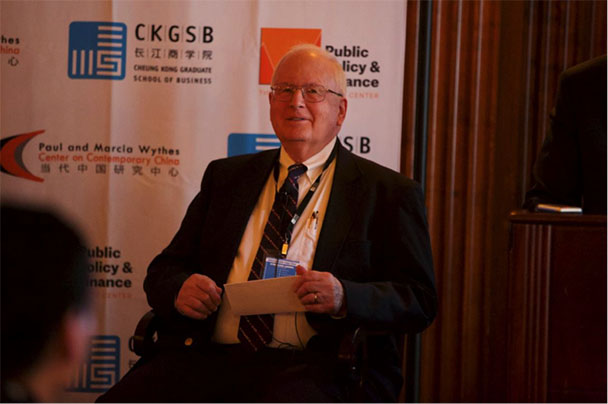
The Symposium then shifted gears with a panel on US-China relations, featuring Ambassador Stapleton Roy (pictured above), founding director Emeritus of the Kissinger Institute on China and the United States at the Wilson Center, Professor Thomas J. Christensen, director of the China and the World Program at Princeton University and Daniel Rosen, the founder and China director of the Rhodium Group.
During his opening remarks, Rosen said economic relationships with China will “be shaped by two-way capital flows” and the extent through which Beijing will put in place changes to resolve the “fundamental economic challenges” of the country.
Longer-term, the key factors for China are the ageing of the country’s population and disruptive technological changes which would hit global economies in the years ahead.
Xiang Bing, the founding Dean and Professor of China Business and Globalization in CKGSB, said in the same forum that disruptive technologies such as artificial intelligence would have “profound implications for the global economy and social stability” in a number of countries given “the potential to eliminate many jobs.”
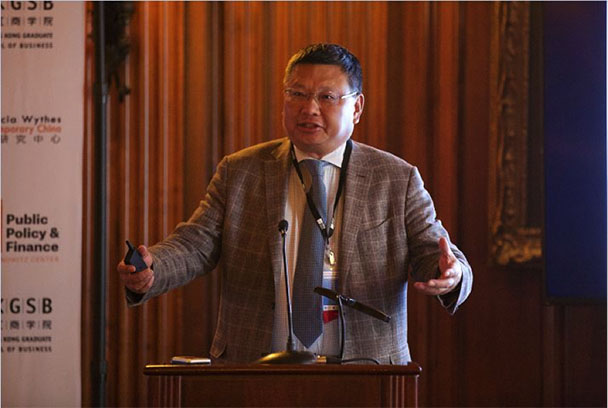
Dean Xiang (pictured above) has played a major role in the development and innovation of China’s management education sector. His research interests include state and business relations, the reform of state-owned enterprises, and the role of the private sector in China.
Meanwhile, Professor Mei said that as far as ageing is concerned, the question that China faces would be if the country suffers the same fate as Japan in wrestling with a growing population of senior citizens.
He believes the options would be “to delay retirement” and work longer, or rely – as he half-jokingly put it – on “Asian values”, which means asking your children or your extended family to look after you.
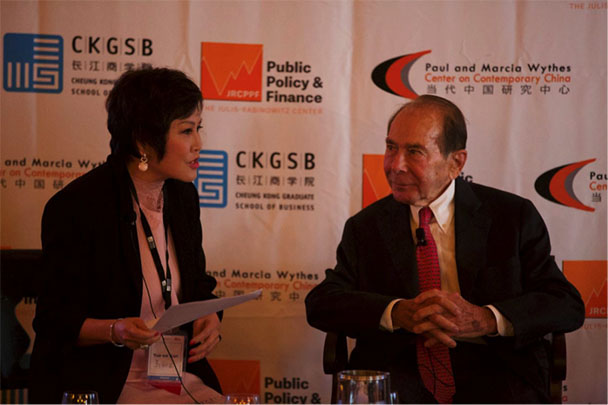
The symposium also featured remarks from C.V. Starr & Co. Chairman and CEO Hank Greenberg, who was talking with Emmy-award winning host Yue-Sai Kan, and Ambassador Zhang Qiyue, the current consulate general of the People’s Republic of China in New York.